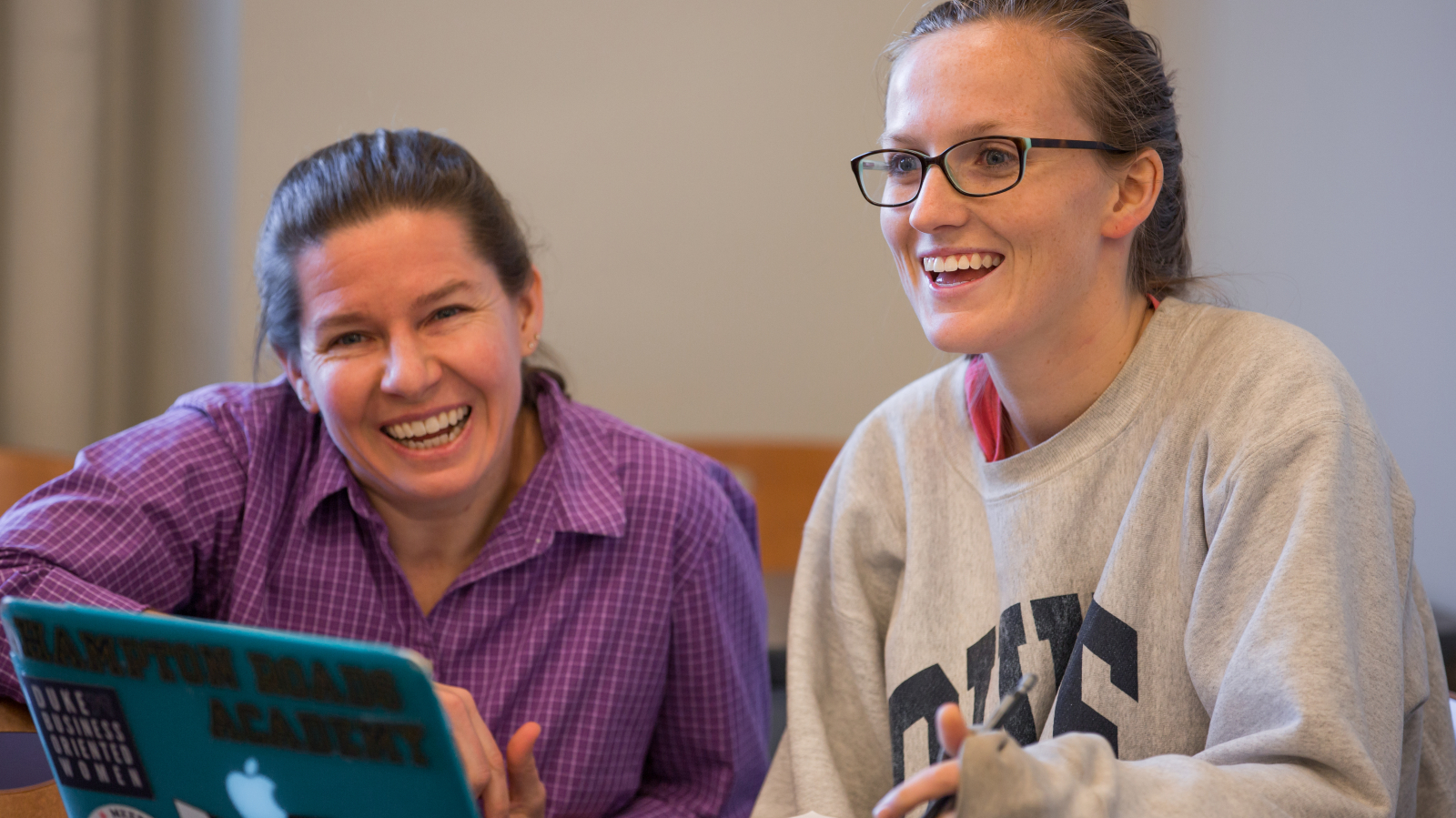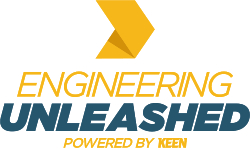KEEN Teaching: Duke Engineering Faculty Engage with National Education Network
Mark Schreiner
Faculty are creating impactful educational experiences grounded in problem-based learning and an entrepreneurial mindset

When students in Stacy Tantum’s Fundamentals of Data Analysis course set out to test their skills in data clustering, they leave the textbooks behind. Instead, they venture into the byzantine world of Division 1 NCAA football conference membership.
Tantum gives her students at Duke’s Pratt School of Engineering the task of examining how the current university members of the ACC, B1G, Big 12, Pac-10 and SEC are clustered on the map of the United States. (Pro tip: Geography doesn’t seem to correlate strongly with the conference to which a college belongs.)
After choosing a mode of analysis and gaining insights as to why the conferences are populated the way they are (is it access to TV markets?), students are then challenged to find the best conferences into which to place the independent teams: Army, BYU, Notre Dame and U-Mass Amherst.
Beyond making the project engaging by using a real-world data set and context, there’s more at work here, said Tantum, the Bell-Rhodes Associate Professor of the Practice of Electrical and Computer Engineering.
“In the course, students have tackled parts of the question in their textbook homework problems,” she said. “But those are abstract. With the football conference mini-project, I removed the guardrails, as it were, for the students. They enter a scenario with lots of details, but not a lot of explicit cues about what they’re supposed to do to answer the problem.”
Over summer 2021, engineering educator Stacy Tantum attended a four-day virtual conference. During the sessions, she heard presentations on pedagogical research backing up the value of authentic problem-solving. Then, in a break-out session, she and her peers applied those research principles in a model teaching exercise—make a prototype and marketable holiday ornament to size specifications from chenille stems and some modeling dough.
Such an authentic project, presented in an open-ended manner, does a lot of good things. It sparks curiosity. It makes students seek out connections among all they’ve learned in the course (and perhaps other courses). And it gets them thinking like engineers—about creating a product that another person would find helpful or valuable.
“In this case, it would be real, actionable insights into why it makes the most sense, say, that Notre Dame, should be part of the ACC,” she said. “What I’m looking for, almost like a teacher of the humanities or social sciences, is a well-supported answer to the challenge. The goal for the student is to put it all together to find a solution.”
This past summer, Tantum sought to strengthen her approach to problem-based teaching by accessing the resources of KEEN: The Kern Entrepreneurial Engineering Network, which is focused on improving engineering education through fostering curiosity, connections, and creating value.
Duke Engineering is an active member of the partnership of more than 50 colleges and universities across the United States.
Over summer 2021, Tantum attended a four-day virtual conference of university engineering educators. During the sessions, she heard presentations on pedagogical research backing up the value of authentic problem-solving. Then, in a break-out session, she and her peers applied those research principles in a model teaching exercise—make a prototype and marketable holiday ornament to size specifications from chenille stems and some modeling dough.
Duke joined KEEN in 2019. Ann Saterbak, professor of the practice in biomedical engineering and director of Duke Engineering’s First-Year Design Program, and fellow engineering faculty members Martin Brooke (ECE) and Mark Palmeri (BME) co-lead the KEEN initiative at Duke.
The Kern Family Foundation also provided Duke a grant—Purposefully Duke—that draws Duke Engineering together with the Duke Divinity School and Duke’s Kenan Institute for Ethics to integrate discussions and examinations of character-based ethics into the student experience.
The Kern Family Foundation also provided Duke a grant—Purposefully Duke—that draws Duke Engineering together with the Duke Divinity School and Duke’s Kenan Institute for Ethics to integrate discussions and examinations of character-based ethics into the student experience.
Also, Saterbak is the principal investigator for a project funded by a Kern grant entitled, “Creating Value: Identifying and Specifying Student Design Projects.”
KEEN shares teaching ideas that build up a student’s entrepreneurial mindset—which KEEN defines as the ability to recognize and identify opportunities, focus on the impact of those opportunities, and create value in any context.
Duke Engineering faculty have engaged with the network via conferences, workshops, and online resources, including contributing their own creative teaching strategies and ideas to benefit partners at other schools.
“At KEEN workshops and conferences I’ve learned many educational techniques that I now use in my classes, such as Scrum, NABC value proposition, and others,” said Rabih Younes, assistant professor of the practice in ECE. “I also noticed that KEEN may use different words for many of the same things I do in my classes. We’re all talking about the same things. It’s been a great learning opportunity. KEEN helped me refine and optimize my techniques.”
 One KEEN resource that Tantum has found engaging is the network’s browsable collection of more than 1,800 “cards“—each one a complete project description provided by a faculty member at a network university. One attractive ‘card’ she discovered posed an authentic project for the teaching of fundamental solid mechanics—”Build a Stronger Bookshelf.”
One KEEN resource that Tantum has found engaging is the network’s browsable collection of more than 1,800 “cards“—each one a complete project description provided by a faculty member at a network university. One attractive ‘card’ she discovered posed an authentic project for the teaching of fundamental solid mechanics—”Build a Stronger Bookshelf.”
Being part of the KEEN network has been valuable, said.
“I’ve been able to see what others are doing,” she said, “I have learned new things and gotten ideas about how I can make my teaching even stronger.”
- Learn more about KEEN at engineeringunleashed.com
- More about Duke Engineering’s Signature Undergraduate Experience: pratt.duke.edu/inspired
